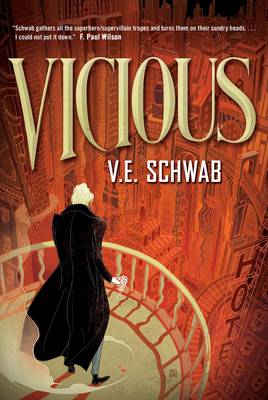
Victor and Eli started out as college roommates - brilliant, arrogant, lonely boys who recognized the same sharpness and ambition in each other. In their senior year, a shared research interest in adrenaline, near-death experiences, and seemingly supernatural events reveals an intriguing possibility: that under the right conditions, someone could develop extraordinary abilities. But when their thesis moves from the academic to the experimental, things go horribly wrong. Ten years later, Victor breaks out of prison, determined to catch up to his old friend (now foe), aided by a young girl whose reserved nature obscures a stunning ability. Meanwhile, Eli is on a mission to eradicate every other super-powered person that he can find-aside from his sidekick, an enigmatic woman with an unbreakable will. Armed with terrible power on both sides, driven by the memory of betrayal and loss, the arch nemeses have set a course for revenge-but who will be left alive at the end?
I’ll admit I’m a latecomer to the whole superhero world. I thank my husband for sharing his love for D.C. and Marvel even though I still couldn’t tell you which character belongs to which universe. Over the years, I’ve come to learn that I like my superheroes and their rivals with a bit of angst. What makes a person (outside of some genetic mutation or radioactive accident) a hero or a villain? Is a hero’s strength the villain’s weakness?
Vicious grabbed my attention almost immediately. Victor and Eli wrestle with the philosophy of what makes a person a hero or a villain. There’s a bit of science behind the creation of an ExtraOrdinary person and beyond the actions of the different characters in the story provide the philosophical base for driving the plot of Vicious forward. There’s moral gray area throughout the entire story. Who is in the right and who is in the wrong? Which character, Victor or Eli, will I side with in the end?
The philosophical debate provides a base for the plot, the way the story is told creates the tension and drives the story forward while looking back. A unique blend of flashbacks and a ticking clock (Victor and Eli’s final battle is scheduled for Midnight) gives you insight into what is motivating the characters both in the past and the present. And that motivation appears to be simple, but as the flashbacks gets closer to present time and the present time moves closer to Midnight, you realize that nothing is simple in Victor’s and Eli’s world. This score will not be settled easily.
This review was originally posted on Second Run Reviews
Reading updates
-
Started reading
-
14 May, 2017:
Finished reading
-
14 May, 2017:
Reviewed
